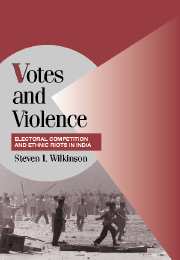Book contents
- Frontmatter
- Contents
- List of Figures
- List of Tables
- Acknowledgments
- 1 THE ELECTORAL INCENTIVES FOR ETHNIC VIOLENCE
- 2 EXPLAINING TOWN-LEVEL VARIATION IN HINDU-MUSLIM VIOLENCE
- 3 STATE CAPACITY EXPLANATIONS FOR HINDU-MUSLIM VIOLENCE
- 4 THE CONSOCIATIONAL EXPLANATION FOR HINDU-MUSLIM VIOLENCE
- 5 THE ELECTORAL INCENTIVES FOR HINDU-MUSLIM VIOLENCE
- 6 PARTY COMPETITION AND HINDU-MUSLIM VIOLENCE
- 7 THE ELECTORAL INCENTIVES FOR ETHNIC VIOLENCE IN COMPARATIVE PERSPECTIVE
- 8 DEMOCRACY AND ETHNIC VIOLENCE
- Appendix A Data Sources for Hindu-Muslim Riots
- Appendix B Data-Entering Protocol for Riot Database
- Appendix C Additional Results from Statistical Tables
- References
- Index
- Cambridge Studies in Comparative Politics
1 - THE ELECTORAL INCENTIVES FOR ETHNIC VIOLENCE
Published online by Cambridge University Press: 28 July 2009
- Frontmatter
- Contents
- List of Figures
- List of Tables
- Acknowledgments
- 1 THE ELECTORAL INCENTIVES FOR ETHNIC VIOLENCE
- 2 EXPLAINING TOWN-LEVEL VARIATION IN HINDU-MUSLIM VIOLENCE
- 3 STATE CAPACITY EXPLANATIONS FOR HINDU-MUSLIM VIOLENCE
- 4 THE CONSOCIATIONAL EXPLANATION FOR HINDU-MUSLIM VIOLENCE
- 5 THE ELECTORAL INCENTIVES FOR HINDU-MUSLIM VIOLENCE
- 6 PARTY COMPETITION AND HINDU-MUSLIM VIOLENCE
- 7 THE ELECTORAL INCENTIVES FOR ETHNIC VIOLENCE IN COMPARATIVE PERSPECTIVE
- 8 DEMOCRACY AND ETHNIC VIOLENCE
- Appendix A Data Sources for Hindu-Muslim Riots
- Appendix B Data-Entering Protocol for Riot Database
- Appendix C Additional Results from Statistical Tables
- References
- Index
- Cambridge Studies in Comparative Politics
Summary
In the 1960s Richard Nixon, reflecting on race riots in America, tried to define the difference between riots and other types of violent conflict. “Riots,” he said, “are spontaneous. Wars require advance planning.” My argument in this book, by contrast, is that ethnic riots, far from being relatively spontaneous eruptions of anger, are often planned by politicians for a clear electoral purpose. They are best thought of as a solution to the problem of how to change the salience of ethnic issues and identities among the electorate in order to build a winning political coalition. Unpleasant as this finding may be, political competition can lead to peace as well as violence, and I identify the broad electoral conditions under which politicians will prevent ethnic polarization and ethnic violence rather than incite it. I demonstrate, using systematic data on Hindu-Muslim riots in India, that electoral incentives at two levels – the local constituency level and the level of government that controls the police – interact to determine both where and when ethnic violence against minorities will occur, and, more important, whether the state will choose to intervene to stop it.
Pointing out that there is a relationship between political competition and ethnic violence is not in itself new. Ethnic violence has often been portrayed as the outcome of a rational, if deplorable, strategy used by political elites to win and hold power. Bates, for example, argued two decades ago that in Africa, “electoral competition arouses ethnic conflict.”
- Type
- Chapter
- Information
- Votes and ViolenceElectoral Competition and Ethnic Riots in India, pp. 1 - 18Publisher: Cambridge University PressPrint publication year: 2004



